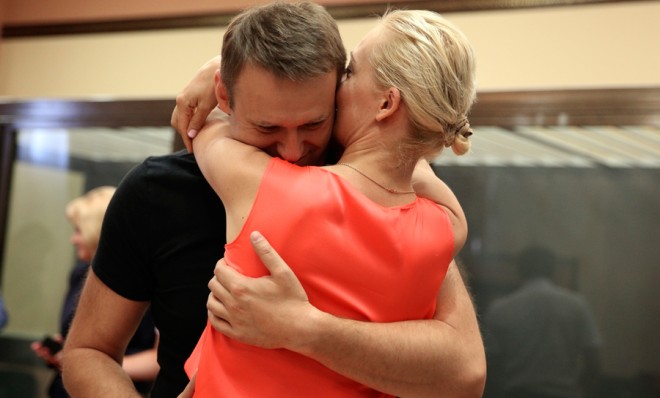3 theories on why Russia released opposition activist Alexei Navalny
The anti-Putin protest leader was sentenced to prison on Thursday, then freed on Friday


A free daily email with the biggest news stories of the day – and the best features from TheWeek.com
You are now subscribed
Your newsletter sign-up was successful
A Russian court freed anti-corruption activist Alexei Navalny from jail Friday pending the appeal of his conviction on embezzlement charges.
The unexpected move came just a day after Navalny, an outspoken critic of Russian President Vladimir Putin, was sentenced to five years in prison, a punishment that crystallized the crude extent to which Putin's regime would go to silence critics and squelch democratic dissent.
So why the about-face?
The Week
Escape your echo chamber. Get the facts behind the news, plus analysis from multiple perspectives.

Sign up for The Week's Free Newsletters
From our morning news briefing to a weekly Good News Newsletter, get the best of The Week delivered directly to your inbox.
From our morning news briefing to a weekly Good News Newsletter, get the best of The Week delivered directly to your inbox.
There are three basic theories about what the Kremlin is up to. The first — suggested by Navalny himself — is that the government was pressured into backtracking by public outrage at Navalny's conviction. Several thousand supporters gathered at Manezhnaya Square next to the Kremlin after the sentencing Thursday, chanting "Freedom!" and "Putin is a thief!"
Navalny said his release was a victory for "people power." His conviction, he added, "had been vetted by the presidential administration — but when people came out on Manezhnaya, they rushed to go back on that decision."
However, that was not the official reason prosecutors gave for the unusual — some say unprecedented — request to spring him. They told the judge that Navalny, who is a candidate for mayor in Moscow, should be free to exercise his right to campaign until a decision is made on his appeal.
That sets up the second theory for Navalny's sudden turn of fortune. Putin's government is confident that its man in Moscow, acting Mayor Sergei Sobyanin, will win the election, but fear that voters won't consider the victory legitimate unless Sobyanin faces credible opposition. "That calculation — more than the street protests — appears to have been the deciding factor in the prosecutors' motion," says Will Englund at The Washington Post.
A free daily email with the biggest news stories of the day – and the best features from TheWeek.com
The third theory is a twist on the second. Daniel Sandford at BBC News argues that leaders in the Kremlin are looking far beyond Moscow's Sept. 8 mayoral vote. The ultimate goal here, Sandford says, is to defuse Navalny as a threat to Putin, and then get rid of him for good.
Perhaps the most convincing explanation is that Russia's men of power want to do three things — discredit Alexei Navalny, show his lack of support, and then get him out of the way.This they would achieve by first convicting him of a corruption offense, second, freeing him to fight an election and lose, and third, jailing him again. [BBC News]
Harold Maass is a contributing editor at The Week. He has been writing for The Week since the 2001 debut of the U.S. print edition and served as editor of TheWeek.com when it launched in 2008. Harold started his career as a newspaper reporter in South Florida and Haiti. He has previously worked for a variety of news outlets, including The Miami Herald, ABC News and Fox News, and for several years wrote a daily roundup of financial news for The Week and Yahoo Finance.
-
 How the FCC’s ‘equal time’ rule works
How the FCC’s ‘equal time’ rule worksIn the Spotlight The law is at the heart of the Colbert-CBS conflict
-
 What is the endgame in the DHS shutdown?
What is the endgame in the DHS shutdown?Today’s Big Question Democrats want to rein in ICE’s immigration crackdown
-
 ‘Poor time management isn’t just an inconvenience’
‘Poor time management isn’t just an inconvenience’Instant Opinion Opinion, comment and editorials of the day
